Diversity
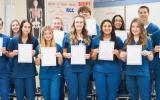
In July 2022, Rogue Community College’s (RCC) new President, Dr. Randy Weber, energized the college with an initiative to stabilize enrollment. This was identified as the first of five institutional priorities. Leveraging his expertise in strategic enrollment management (SEM), Weber, in collaboration with the newly appointed Dean of Enrollment Management, spearheaded a strategic shift. This transition moved the college from a narrow focus on recruitment and new students to a more comprehensive approach, embedding American Association of Collegiate Registrars and Admissions Officers SEM...
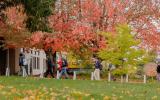
The Seattle Promise Initiative, a pioneering program launched by the City of Seattle, aims to ensure that all public high school graduates in Seattle have access to higher education without the financial burden of tuition. An innovative component of this initiative is the Path to UW program, a collaboration between the Seattle Department of Education and Early Learning, Seattle Colleges, and University of Washington (UW). The program provides targeted support to Seattle Promise students as they transfer from community colleges to one of the most competitive universities in the nation....
Tags:

When St. Louis resident Bobbie Simmons enrolled at St. Louis Community College (STLCC) to study medical coding, it seemed like she was finally on the path to a rewarding career in a high-demand field. Then a serious health issue set her back, threatening her ability to maintain a dependable source of income for rent. “It was hard focusing on my schoolwork when I didn’t know if I’d have a roof over my head,” said Simmons. Her story is not unique; many students at STLCC face similar challenges.
Thanks to a new STLCC program, students like Simmons, who face housing insecurity, now have a...
Tags:
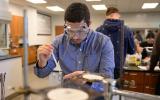
Incoming first-year students at Moraine Valley Community College who are interested in pursuing a degree in science, technology, engineering, and mathematics (STEM) have an opportunity to participate in the Greer Scholars Program, which seeks to diversify STEM careers by funding and supporting students who are underrepresented in these fields.
The Greer Foundation, which champions organizations committed to helping people improve their lives, chose Moraine Valley as the first Chicago-area community college grantee to support a cohort of students as Greer Scholars. The foundation has been...
Tags:
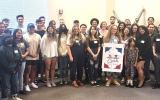
Student access and success are foundational to the community college mission. The learning paradigm proposed by Barr and Tagg (1995) initiated the student success movement, which paved the way for the completion agenda in the 2000s. However, only approximately 26 percent of community college students transfer to a four-year institution (Sansing-Helton et al., 2021). The situation is even bleaker when we evaluate the STEM fields. According to the Community College Research Center (2022), low-income community college students are less likely to transfer to a STEM field, and only 14 percent of...
Tags:
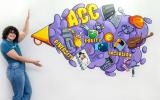
Embracing neurodiversity in educational environments entails challenging traditional perspectives on cognitive differences. The term neurodiversity acknowledges the inherent variation in neurological functioning, emphasizing that diverse cognitive profiles contribute to the richness of the human experience. It encompasses conditions such as autism spectrum disorder, attention-deficit/hyperactivity disorder (ADHD), dyslexia, dyspraxia/developmental coordination disorder, Tourette syndrome, sensory processing disorder, obsessive compulsive disorder, and social pragmatic communication disorder,...
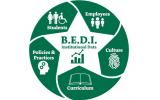
Delta College exists as a microcosm of our larger society and is, therefore, impacted by historical inequities. Many sociocultural factors prevail at Delta College which predate the current student body, faculty, staff, and administration. Nonetheless, we cannot deny that we all contribute to the current health and vitality of our learning community. Grace Lee Boggs (Harewood & Keefer, 2009) wisely asserted that “you cannot change any society unless you take responsibility for it, unless you see yourself as belonging to it and responsible for changing it” (para. 60). We are committed to...
Tags:
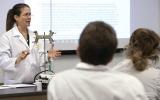
With a focus on accessibility, diversity, and job-relevant education, community colleges are well-positioned to address the evolving needs of students and the workforce. Within the broader field of higher education, community colleges can serve as laboratories for experimentation in pedagogy and curriculum while providing affordable and high-quality education (Hadzi-Antich, 2023).
Recognizing the crucial role of quality and innovative teaching, Johnson County Community College (JCCC) used its strategic plan to leverage student learning to the forefront of institutional initiatives. Goal 1,...
Tags:

Since its inception, Anne Arundel Community College’s (AACC) Model Course Program has provided over 100 faculty members with the opportunity to deepen their understanding of social hierarchy, structural inequalities, and individual-level biases and to apply diversity, equity, inclusion, antiracism, and accessibility (DEIAA) theory and praxis to their curriculum and pedagogy. The program began with a focus on highly enrolled classes, with the goal of eradicating race/ethnicity-based equity gaps in student outcomes. Each year, the program has evolved, expanded, and continuously improved based...
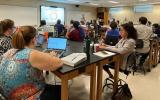
According to a study by the National Academies of Sciences, Engineering, and Medicine (Skorton & Bear, 2018), "educational programs that mutually integrate learning experiences in the humanities and arts with science, technology, engineering, math, and medicine (STEMM) lead to improved educational and career outcomes” (p. 2). With a focus on such outcomes, it's time for community colleges to thoughtfully and intentionally weave the sciences, technology, engineering, arts, and mathematics (STEAM) into students' learning experiences. An integrated STEAM curriculum fosters key skills which...
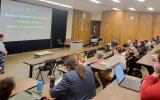
Monroe Community College (MCC) prioritizes the intersection between global learning and social justice. Our mission statement calls for us to build global engagement and understanding while strengthening the college’s commitment to community, service, and justice (Monroe Community College, 2022). Through curricular programming, professional development, and strategic partnerships, we are attempting to create global citizens who are committed to making the world a just and safe place for all.
MCC, in Rochester, New York, boasts a diverse and global student body. We currently have over 800...
Tags:

Colleges and universities across the U.S. and beyond are striving to recruit and retain a diverse faculty that is representative of their student populations. Institutions have revamped their practices to ensure that faculty diversity is at the forefront of hiring considerations; everything from recruitment practices to committee trainings has been transformed with great care. A recent step taken by Austin Community College (ACC) to enhance its diversity efforts was to pilot the inclusion of the student voice when hiring full-time faculty. While it is standard practice to involve graduate...
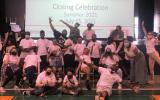
This summer, dozens of middle school students in Pittsburgh, including those from underserved communities, discovered that science, technology, engineering, and math (STEM) is fun, that it’s ok to be smart, and that education can offer a path to a brighter future. Through a partnership with Verizon and the National Association for Community College Entrepreneurship, the Community College of Allegheny County (CCAC) hosted the Verizon Innovation Learning STEM enrichment program. The initiative is part of Citizen Verizon, the company’s responsible business plan for economic, environmental, and...
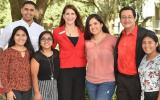
The Hispanic Association of Colleges & Universities (HACU) recently designated Polk State College as a Hispanic-Serving Institution (HSI), as the college’s Hispanic student population has reached 26 percent and continues to grow. Additionally, Polk State is now eligible for Title V and HSI STEM federal grant funds that support institutions that enroll large proportions of minority and financially disadvantaged students. The college will apply for these funds through the U.S Department of Education to further support students.
Equity and a presence in underserved communities with targeted...
Tags:

A unique partnership between Johnson County Community College’s (JCCC) Continuing Education Transportation program and Johnson County Adult Education’s (JCAE) Literacy program puts newly trained truck drivers on the road to success. The initiative helps non-native English speakers in Johnson County obtain workforce skills in truck driving.
Chris Specht, former Program Coordinator of Accelerating Opportunity: Kansas at JCCC, began laying the groundwork in 2017. Thanks to the combined effort of many at the college, the program officially launched in summer 2020.
“The collaboration between the...
Tags:
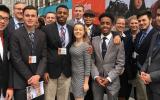
The Model United Nations (UN) program is extremely popular throughout the United States and globally, with hundreds of thousands of students from all levels of education participating every year (United Nations, n.d.). This UN simulation enables college students to engage in and learn about international political issues and the UN while developing their communication, deliberation, leadership, and debate skills. According to National Model United Nations (NMUN) (n.d.),
Cooperative, hands-on, experiential learning allows students to confront a range of topics with the perspective of their...
Tags:

The Community College of Allegheny County (CCAC) Honors Council is offering a new pilot program called Give Honors A Try! The program permits non-honors students who meet certain criteria to take honors courses and engage in honors-related activities. Each year, CCAC’s Honors Program provides a myriad of opportunities for scholastically minded students to develop leadership skills and to participate in a variety of conferences and community service projects that foster academic and personal enrichment. These include opportunities to hear from guest speakers, field trips, real-world...
Tags:
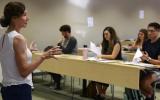
San Diego Mesa College is partnering with San Diego Unified School District, San Diego State University (SDSU), and National University to mold a new generation of K-12 educators from diverse backgrounds who reflect the students they teach. The Teacher Pathway Inclusion Program was launched in April 2019 and includes a bevy of support services to create a seamless route for high school students to earn a bachelor of arts degree and teaching credential, with an emphasis on filling a growing need in science, mathematics, and special education. Mesa College aims to enroll 50 students...
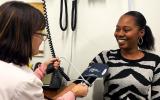
As much as the faculty, classified professionals, and administration at San Diego City College take pride in the 1,500 classes and 200+ degree and certificate programs offered at the 60-acre urban campus, they also understand that the college’s role in supporting and empowering students goes far beyond the classroom. For instance, thirty-nine percent of college students experience significant mental health issues, yet two-thirds with anxiety or depression do not seek treatment (Active Minds, n.d.). Even more alarming is the fact that suicide is the second leading cause of death among college...
Tags:










